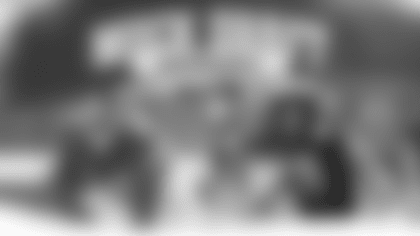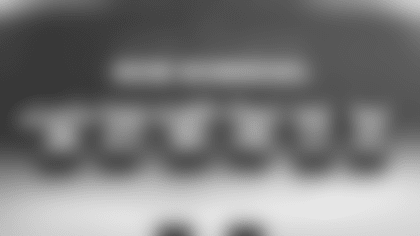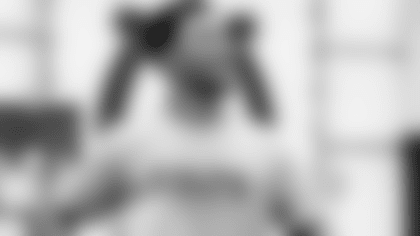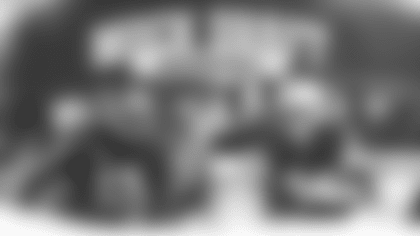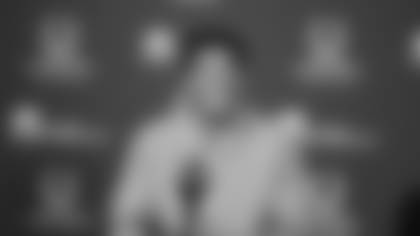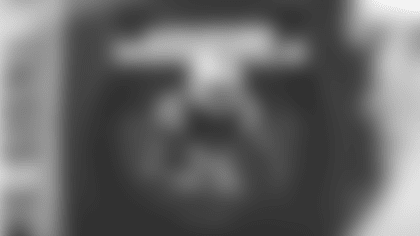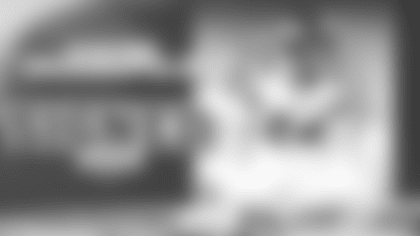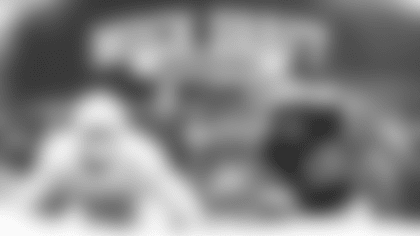INDIANAPOLIS — Indianapolis Colts general manager Chris Ballard on Friday joined 1075 The Fan's Dan Dakich to discuss a multitude of Colts-related topics, such as Jacoby Brissett's future, the performance of the 2019 rookie class, Andrew Luck's retirement and much, much more.
Here's that conversation in its entirety, which you can also listen to below:
Dakich: Is the quarterback of the Colts in the building right now? You said "jury's out" on Jacoby Brissett.
Ballard: "Well, I'll say this, and I said this in my press conference: I thought Andrew Luck was gonna be our quarterback starting Week 1 this (last) season, so I won't make that prediction. But I'll make some comments about Jacoby: it's almost like the tale of two seasons. We've gone back and we're having big meetings next week, just evaluating — we take a month after the season, 'cause if you do it right after the season, you're pissed, it's not good, you're not getting a real evaluation. So we go back and watch everything. And watching Jacoby (the) first seven or eight games, you know, Jacoby was playing good football: making quick decisions, making the throws that needed to be made, we were really good on third down — I think we were at like first or second in the league on third down. And then we just hit a stretch in the second half of the season we didn't play as well. So Jacoby knows he's gotta play better, and we've gotta help him — I've gotta help him, Frank's (Reich's) gotta help him and those things, and he's gotta help himself with better play."
Dakich: When did you guys know Andrew Luck wasn't coming back?
Ballard: "Monday before we played Chicago (in the preseason), Andrew came in, and we had a meeting with Mr. Irsay, Frank, Andrew and I. That's the first time we knew."
Dakich: That's the first time?
Ballard: "First time we knew. In terms of his attitude and his excitement for football, he was frustrated during training camp, but I had seen that frustration before, you know, with the shoulder, and at no point did any of us ever think retirement was going to exit out of his mouth."
Dakich: During the offseason with Luck, it was the calf and then the ankle. What happened there with all the misdirection?
Ballard: "Yeah, and, man, I'm not gonna lie: I mean I get why, because it was so hard for us to pin down — we couldn't pin down exactly what the injury was, 'cause Andrew's pointing and telling us, 'Look, this upper-calf area is hurting. I can't get it better.' So we're MRI-ing the calf, there's a little edema in there, we're working on it. And finally we sent him to another (doctor), we said, 'Look, we need to get another opinion,' and the doctor said, 'Well, well need to be looking at the ankle.' And that's when Mr. Irsay came out with that statement, and we were actually getting it looked at the time — which it ended up not being that actual point, but it ended up being in the front of the ankle. And they said, 'Look, sometimes you have symptoms that will go up into your calf.' So, no, there was no misleading. You've been around me long enough — like if you ask me a question, I'm too stupid to freakin' lie. I mean, I just give you an answer. But there was no misleading. I mean, when you've got a top-five quarterback, who would mislead and try to keep him around — that's not good for the team, that's not good for anybody if we were to do that."
Dakich: Some felt like you knew Luck wasn't coming back in March, you keep him around for marketing purposes and there's a payoff at the end for him.
Ballard: "Well, then let's go to even more extreme on my side of it: so now you're giving me no credit for having any brain for saying: 'You know what, so we got Jacoby, but then who was after Jacoby? You've got Chad Kelly, who we had just signed late, we didn't address it in free agency, we studied it in the draft, but we didn't even address (it).' So that's giving me no credit. That's like saying, 'Chris, you have no clue what you're doing.' Which, I get that."
Dakich: But if you're really and truly trying to hide this for marketing purposes, you wouldn't address it — because you always know you can pick up a guy like Brian Hoyer.
Ballard: "But wouldn't you want to get the guy in the building, so you can know you have (him) and he's been in there all offseason, he can work?"
Dakich: So what you're saying to me is that theory is complete nonsense?
Ballard: "(It's) false."
Dakich: What was your initial reaction to Luck's retirement?
Ballard: "You know, I remember at the press conference they asked me this exact question: of course I tried to reason with him, and Frank and Jim and all three of us did. We said, 'When you make this decision, now, it's hard to come back from.' But we talked it through all week, and at that point, you don't have time — you've gotta find a way to win games. Nobody gives a crap about your problems. Nobody cares — they're just glad you got 'em. So we don't have time to worry about (it). No — we've gotta keep moving and we've gotta roll, and we've gotta get moving forward. So at that point, 'Alright, he's retiring. What can you do?' I feel bad for the kid, I feel bad for the story — football lost a freakin' great representative of the game of football, the Colts lost a great freakin' player — but we've gotta go. We've gotta move forward and we've gotta find a way to win games, and that's what we did. After the season, I thought about it a little bit, like, you know, 'Hey man, this guy's a special player.'"
Dakich: Did it make you appreciate Luck more going through this season without him?
Ballard: "There's two things I appreciate now about him: one, his daily commitment to the process of getting better. 'Cause when you have a great player, it spreads throughout the building. Jeff Van Gundy always used to say when your best player is your best worker, your best teammate, everybody else falls in line. And then as a leader — and I think Jacoby's pretty good in this area, too — but as a leader — and Andrew had a different way about it; he's a lot different in the meeting room than he was on the field — but just in terms of how he would hot guys accountable internally, of, 'Stay focused on the process, stay focused on getting better, do the little things right,' those things I appreciate more now that he's gone."
Dakich: You've made the comment, "This isn't about one guy." But your quarterback played poorly in the fourth quarter for most of the year. Did your opinion change at all on "This isn't about one guy?"
Ballard: "Well, I've always said I know the importance of the quarterback position. I get that. But you've gotta be able to find different ways to win games. When that guy's not playing lights out all the time, you've gotta find a way to win — there's a way to win every game. There is. There is a way to win — even when your talent (isn't as good), there's a way to win every game. More games are lost than won, in every sport. Don't muck the game up, man. Don't muck the (game). Penalties, turnovers, miscommunication, bad technique — all those things, those muck the game up, man, and you can't muck the game up. And we mucked some games up this year."
Daklch: How do you improve Brissett or any quarterback in the fourth quarter? Is it just experience?
Ballard: "He's gotta play. You know, you've gotta play. We've gotta help him. The injuries at wideout — and I've gotta do a better job, us and the personnel staff, of making sure we have enough depth to where when those guys have to play, they're ready to play…"
Dakich: You're talking about receiver/playmaker types?
Ballard: "The playmaker-type player, whether it's receiver, tight end, running back — it doesn't matter to me. Just somebody that can make those game-changing plays in the big moments in games. And that's not just offensively, that's defensively, too. I think it goes on both sides of it."
Dakich: Did Eric Ebron quit on the Colts?
Ballard: "Let me say this: Eric Ebron, last year (2018) he was excellent. I mean, he had as big a year as you'd want out of a tight end. He had the ankle during training camp, we knew he had the ankle. He fought through it, and he got to a point where he said, 'I can't go anymore."
Dakich: Do you buy that?
Ballard: "He can't go anymore."
Dakich: Anthony Castonzo says he's considering retirement after the season. Two things: how worried are you, do you try to do anything to dissuade him, and does that change your draft focus?
Ballard: "Well, look: we know the importance — like, to me, left tackle's one of the core positions. And we think a lot of Anthony Castonzo. I'll never beg a player to play. I think when you do that — I mean, this game's hard enough, and the commitment level it takes for these guys to get ready, they've gotta be 100-percent mentally in. If they're not, then they need to go a different direction. No. I mean, look: I do think Anthony Castonzo's playing at a high level still, I think he's got three or more more years of high-level play at left tackle. Do we communicate? Yes we do — pretty regularly. But it's not a begging situation where I'm begging him to play. Do we need him back? Yeah, we'd like to have him back, and if he decides to retire, then we're gonna have some work to do; whether it's in free agency or the draft, we're gonna have some work to do."
Dakich: Harder to find, a quarterback that you can rely on, or a left tackle that you can plant in there and say, 'We're not worried about it?'
Ballard: "Hardest position in sports is to play quarterback."
Dakich: Let's take quarterback out. Is there any position harder to find than a a very good left tackle?
Ballard: "A left tackle's hard to find. They're not easy. They don't grow on trees. Now, you can take an average left tackle and help him — slide the protection, chip, line up a tight end up. You can do some things to help him, but when you have a left tackle that you don't have to give help, that opens up a lot; that allows you to help other people, and get more people into the route and helps your passing game. So they're not easy to find: good, starting left tackles that you don't have to help are not easy to find. And it takes time. They've gotta play. I mean, even Anthony would tell you, it wasn't until about Year 5 or 6 that he felt comfortable technique-wise — just the technique of our game. Like it's so much different than college football: the violence, the speed, the things they're facing, the looks they're facing, the pass rushers and the speed and power. It takes time from a technique standpoint. I mean, I've watched the development of Eric Fisher, who were took in Kansas City, and people were killing this guy. And now he's one of the better left tackles in the league. It takes time."
Dakich: The fans really wanted Chad Kelly to get a shot. Is Kelly in any type of future plans?
Ballard: "Let me tell you this: he's got some natural playmaking to him. Here's my deal with Chad, because I heard the clamoring, too — my kids. I mean, they love Chad; they love Jacoby, and they love Chad. I mean, Chad had earned trust. I'm not talking about on the field — we had to trust him off the field. I mean, he had screwed up a few times to where, 'We're your last shot here, son. So you're we're gonna have some guidelines here about what you have to do, and you've gotta earn trust.' And first time we cut him, he had this look of, 'You're cutting me?' I'm like, 'Damn right I'm cuttin' you. And you're gonna go to the practice squad and you're gonna continue to work, you're gonna continue to do the things we're asking you to do.' Do I think he has a future in the league? Yes. Does he continue to have to earn trust each and every day? Yes."
Dakich: A lot of big names could hit free agency at the quarterback position this offseason. Are the Colts going to be in play for any of them?
Ballard: "We look at everybody. … Always. I mean, every year. Like, I think you've gotta go through the process every year with every position, but especially with the quarterback position, not only in the draft, but also in free agency, so, one, you know what's playing in the league, how they're playing and how they're using 'em to be successful for No. 1 if you play 'em; and then No. 2, if you get a chance to acquire 'em, and it's the same thing in the college draft: i mean, I think you have to go through that process every year, because you never know. You never know when that time's gonna come when that guy's gonna end up on your roster."
Dakich: Will you entertain bringing a quarterback in to compete with Brissett?
Ballard: "I think it's gotta fall. It just depends on how it falls. You never know. I mean, you don't know. You don't know what's gonna happen in free agency, you don't know what's gonna happen in the draft. It's an unknown every year. If we've got a chance to get better, we're gonna get better."
Dakich: People just assume that the Colts have a ton of available money to spend in free agency. But it's a two-way street right?
Ballard: "That's right. … And one of the big things I talked to Jim about when I got in here was we needed to get a core base of players that are Colts, that are here for a long time. So when you walk around the stadium, you see — I mean, back in the day: Reggie Wayne, Bob Sanders, Peyton Manning, Edgerrin (James). Those jerseys are everywhere. Those guys are Colts for a long time. We had to build up a young base, and then you wanna keep them. And we've started the process of doing that: Kenny Moore, we wanted to keep around; (Mark) Glowinski, we want to keep around. So you wanna re-sign these guys so they're here and you create some roster continuity. So I'm not against free agency — never have been. And I think we've participated in free agency. We might not have participated who everybody wants us to participate with, but I think our free agent signings for the most part have been pretty good. And they've not been cheap, low-dollar guys. I mean, Justin Houston (is) makin' $12 million a year. It's not like he's a cheap option that we just got for nothing. … But you've gotta be able to match the value, what you see the value of the player, to the money. And everybody just thinks that's an easy match? No, it's a two-way street. And I've said this a million times, but that guy's gotta earn the money. He's gotta come in and be worth what you're paying him, not only from a production standpoint, but in that locker room. Because every move you make, they're looking at you, and the second you lose credibility with them, you're done."
Dakich: Let me address that. Everybody in that locker room knows if you don't perform, you're usually out. Adam Vinatieri struggled in 2019. Did the locker room get lost a little bit because you just kept trotting him out there?
Ballard: "That was a tough deal to work through this year because who Adam (is) … take the past production away: work ethic, leadership — I mean, this guy is a leader in the locker room — the way he conducts himself each and every day, the way he works. So he's hurt during camp, starts the season off slow, but then he has a good stretch. I mean, at one point he was Special Teams Player of the Week after he made a 50- and 55-yarder against Denver to win the game. So we thought we had kind of gotten out of it. And then he hit another bad stretch again. And practice was unbelievable for Adam. You'd go to practice, and we'd have five or six kickers in on Monday and Tuesday, and I'd tell Adam, I'd say, 'Adam, I'm bringing guys in.' And you know Adam; he'd get pissy, but he understood. He's a pro. That's the one thing about Adam: he's a pro. And every time I'd work 'em out, I'd go back in and watch the practice tape on Adam — Adam's ball off (hit foot) was better, he's making kicks from 60 yards. So it was tough. It was tough. Did we lose credibility? No. I don't think anybody in the locker room was looking at Adam or anybody else. Because they saw the work, and they saw the production in practice that he was doing."
Dakich: Would you have handled that situation differently looking back?
Ballard: "No."
Dakich: Not even from the start of the season with the injury and all that?
Ballard: "No. No."
Dakich: Do you expect Vinatieri to be back in 2020?
Ballard: "He's rehabbing and we've not had the discussion."
Dakich: Is the running game back en vogue in the NFL? Because the Colts seemed to be positioned pretty well if it is with Marlon Mack and that line.
Ballard: "I don't think it's ever gone away. Look: I think we all know you've still gotta be able to create explosive games in the passing game. You have to. You have to throw the ball in this league to win. But you also have to be able to run it. You can't become some one-dimensional that when you get into these games in December and January that you can't control the clock and move the football with your guys up front. And even if you look back — and I remember last year Frank coming to me and saying, 'Look: we need to have a top-five rushing offense. It's gonna help us; it's gonna help us create more explosive passing (plays) with our play-action plays, and it's gonna help us defensively keeping them off the field.' And what (the San Francisco 49ers) did? That was a thing of beauty last week. I mean, that was freakin' beautiful. What'd they throw the ball: eight times? … I can't remember the last time (I saw that). When we went to the Super Bowl in Chicago, we beat New Orleans to go to the Super Bowl, but it wasn't until the fourth quarter that it looked like that. I mean, it looked like that with Frisco from the first snap. They're ripping off seven-, eight-yard runs."
Dakich: What happened with Deon Cain? A lot of people were excited about him — what happened?
Ballard: "Very talented. You have to do things the way we're asking you to do 'em. So the way we're asking you to work, the way we're asking you to prepare, and if you don't do 'em that way, you're not gonna be here. And it just got to a point where Deon's a young player, and he's a very talented player, but we weren't getting what we needed, and we decided to release him. He didn't get picked up and he was on our practice squad, and then when Pittsburgh came to sign him, he ended up choosing going to Pittsburgh."
Dakich: Devin Funchess — you sign him as a free agent last year, gets hurt in the first game of the season and is on IR the rest of the way. Will you try to re-sign him? That's a bit of a quandary, isn't it?
Ballard: "I know it is. And he's a great kid. You know, that's a frustrating one, because he has a pretty good game that first week against the Chargers, and then right before T.Y. (Hilton) has the great run to tie the game up, we took a shot here in the back with a fade and (Funchess) landed on the shoulder wrong late in the fourth quarter. And we think he's got a lot of talent and could really help us. We'll see. I mean, it takes both sides, and how it works out. Good kid — I know he enjoyed his experience. He was frustrated; he was extremely frustrated all year, 'cause he wanted to play and he wanted to help and he knew he could contribute and help. So we'll see how it works out."
Dakich: When you talk about free agency, in a perfect world you have a ton of money to spend. You didn't spend it last year, and when you don't spend the money and the team doesn't win, people think the team is cheap and it shows up on the field. Is this a good free agent market to spend?
Ballard: "I'll address last year's spending, because we did spend: I think we were 10th in the league in cash spending last year. So Justin and Funchess you see, but then you ignore the Glowinskis — we re-upped a bunch of our own players. So we re-upped Kenny Moore, Jack Doyle — all these guys we're trying to keep in the building we think are good players. And then, you can't buy a championship. And you can't sustain it for sure. And so you've gotta pick and choose your points and your time when you add them in. Like when we added Justin, I mean, there was competition between us and another team for Justin and felt very fortunate to get him. But when you think they can help you win and they fit what you're looking for, you absolutely do it. You sign 'em. I mean, I think can look at just back at my time in Kansas City we did it, and they're still signing certain free agents. But the majority of their roster is guys they brought in and drafted."
Dakich: Looking at this year's NFL Draft, you're selecting 13th overall. Is this the kind of class to add a couple of starters? And what area do you see that really needs to be improved that the fans might not see?
Ballard: "I'll always — I'll preach this to the day I'm out of this game — you win up front; you win on the O-line, D-line. You need a collection of, especially on the offensive line, you need eight at all points. It's gonna have to be addressed, especially from a depth (perspective) with Joe Haeg and Le'Raven Clark and those guys up (in free agency). So we're gonna have to address the depth there. And also on the defensive line. I don't think you can ever have enough defensive linemen. And it takes time for those guys (to develop) — it might be as hard as any position to really develop rushers. I mean, look, absolutely, (if) you can get a Dwight Freeney that's a special, special one, but when you don't get a special one that comes and lights it up right away, you've gotta be able to draft guys with traits and then develop them. And that was the shame of, like, Kemoko Turay, who we thought … I mean, that was a big loss for us. When Kemoko went down, I mean he had just played really well vs. Kansas City, and getting him back, getting (Ben) Banogu, we've gotta get (Tyquan) Lewis … Lewis has gotta come on. It's his time, man. He's gotta get healthy… "
Dakich: And he was a healthy scratch a few times, right?
Ballard: "Yeah, and that was a little with the, when you've got (Jabaal) Sheard, you had Houston, it just got to where we could only dress eight and we couldn't dress nine. But (Lewis has) gotta come on, and this is a big year. And we had a long talk about that. The interior — we've got to be able to get some type of pass rush inside. That helps your edge rushin', when you can get interior pass rush."
Dakich: I know Peyton Manning and Tom Brady did not like somebody rushing them up the middle.
Ballard: "When you can rush the passer up the middle, the quarterback's only got one place to go: and that's he's gotta step out and he's gotta run. That should help your edge."
Dakich: You look at the Colts' 2019 draft class — are you satisfied with where they ended up?
Ballard: "I'll walk through them all. Yeah, we're happy with Rock (Ya-Sin). Rock — I'll say this about Rock: man, the one thing I really like about him, even when he had a rough game, he was in the office on Monday working. I mean, like, he works. He's got the right mindset to be a really good corner in this league."
Dakich: Does he have enough talent?
Ballard: "Absolutely. Absolutely he does. And then you go to Parris (Campbell). You know, we really like Parris Campbell. And every time we'd get him right, something would happen: groin, broken hand, foot. You know, the Tennessee game he has the over route where he has the touchdown where he runs away from Logan Ryan (who) can't cover him in man coverage; against Pittsburgh we were able to get him the ball (and) he had over 100 yards of offense just on fly sweeps and screens. But his body's gotta get right, and he's gotta get healthy where he can stay healthy for a 16-game season…"
Dakich: How does a guy do that? It seems like a lot of luck or misfortune to be able to do that.
Ballard: "It is a little luck. But, look: the grind of the NFL season — the grind of 20 games … I think people forget that. I mean, even though it's preseason and you're not playing a lot, that's still, you're going from playing 12, 13, 14 games to 20 games. And then the intensity and energy that it requires in their bodies on Sunday, it's just different for 'em. So everything has to be right. I mean, we spend a lot of time — and especially with these rookies — there's certain body fat and lean mass and things that we do that they have to get right, and that's an area that Parris is gonna work on hard. I'll say this about Parris Campbell: he's a great kid, he works, he wants to be great. He's got all the right stuff — now we've just gotta help him stay healthy where he can help us. We do think Ben Banogu's got a lot of talent. We saw flashes of it; we need to see more. And I think we will, 'cause he's another really good worker. We really like Khari Willis, we really like Bobby Okereke. We think they're both starters. I think Okereke's got some real special in him. (E.J.) Speed — Speed's an interesting case, 'cause he's probably as talented as anybody we have at inside linebacker, but you're talking about a former wide out that we kicked to linebacker and he's learning how to play. But it'll be fun to watch those guys continue to (develop) — they all have enough talent to play."
Dakich: What's up with Quincy Wilson?
Ballard: "That's a good question. You know, we go through stretches with Quincy — one, the development of Marvell Tell…"
Dakich: But that shouldn't happen to Quincy Wilson, right?
Ballard: "You would hope not. But he lost his (confidence). Played really well vs. Kansas City; had a big game, had a great game vs. (Travis) Kelce. We asked him to match up against Kelce. And then when you start doing the 46-man roster the next couple weeks, and (Wilson) hadn't played on special teams for us a lot, so now when you're doing that final spot, well now you've got Tell that's coming on, you've got all of a sudden (Clayton) Geathers and (Malik) Hooker are back, (George) Odum goes back to a special teams role, and that pushes guys down the line. If you're not in that top-three corner spot, all of a sudden those fourth and that fifth corner have got to be able to play on (special) teams — that fourth and fifth safety gotta be able to play on teams. And those guys were more valuable. And Quincy lost his confidence a little bit. And we had a long talk at the end of the season; he knows he's at a make-or-break point."
Dakich: Khari Willis — he's legitimate, right?
Ballard: "He's legitimate. And he's made of all the right stuff: works, tough, plays through injury. And he's going to be a legitimate safety in this league, and for us."
Dakich: You were part of the Kansas City Chiefs' staff when they drafted Patrick Mahomes. What did you see in Mahomes that made you feel he was different than the other college quarterbacks with huge numbers?
Ballard: "Well the difference between … Pat had a rare arm. Like, Pat could throw it accurately from any arm angle on the field…"
Dakich: And you saw that in college? Or did you see it in a workout?
Ballard: "No, you saw it games. Absolutely. And, I mean, every game was a video game. I mean, he throws for over 600 yards vs. Oklahoma; he's at Baylor, he throws for six touchdowns. And these weren't just dink-and-dunk and those guys were running for 50, and he's getting credit for it. No, these are Pat scrambling around, finally finding somebody and whippin' the ball accurately on the run across the field. No, good for the Chiefs. They took him. They were smart enough to move (up) — look: a part of this, now, is having enough wisdom to be able to see it and know when to take it and know when to do it, and give credit to Coach (Andy) Reid and Kansas City for doing it."
Dakich: As a GM, you live with your moves and your draft decisions forever, right? The same year the Chiefs moved up to select Mahomes, the Chicago Bears took Mitch Trubisky and passed up on Deshaun Watson.
Ballard: "Absolutely. … When you take a guy, you better have a conviction — which I think (the Bears) did; I'll give them a lot of credit for that. They had conviction on it. … You've gotta have conviction, and you do the work. I mean, you do the work, and you go through your process of how you're gonna slot 'em. That's what we spend all this time doing this — from now 'til the draft, we spend all this time studying every number, studying all the tape, talking to as many people as we can about the character, to get these things slotted right so when you get to draft day, you know, 'Hey, these are the guys we want, and this is how we're gonna be able to acquire 'em."
Dakich: What's an important number when you're evaluating a quarterback? Running back?
Ballard: "One number I know is accuracy. That's important. And for a runner, to me, it's always after contact. What are they getting after contact?"
Dakich: And what about getting through the hole quick? Is that how Marlon Mack separates himself?
Ballard: "Marlon has got really good … I always talk about burst. Like, backs, when they don't have burst, there's a couple things: one, they're not gonna be able to get through those quick holes, 'cause they close fast in the league. Defenders are fast and they react fast, and his vision and his speed and his eyes and his burst, they all work together with Marlon. Marlon's a good player, man. Fortunate to have him."




